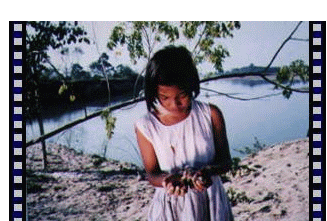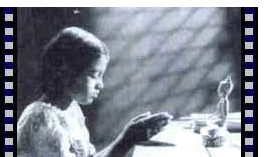Pokhi
Another Jahnu Barua Classic
by D. N. Bezbaruah
Real education takes many forms, and as Professor Ivan Illich
will tell you, much of it happens outside the classroom. Jahnu Barua’s delightful 90-minute film Pokhi (‘And the river flows’, in English) will be seen by many as a film about a little orphaned Cinderella for whom things come out all right in the end. However, it is really a film on education -- the education of the greedy old moneylender, Dayananda, first by his wife and later on by a little girl whom he detested because of his superstitions. And the funding of the film by the DPEP (District Primary Education Programme) was the best thing that the DPEP could have done in the cause of education.
Pokhi is a little girl who lost both her parents in her infancy, and was brought up by her maternal uncle and aunt. Though both of them mean well by her, their grinding poverty and the constant absence of the uncle from home (in search of jobs) results in Pokhi being taken off from school so that she can help her aunt with household chores. Not being able to go to school is itself a deprivation for the bright little girl, and Pokhi spends a lot of time near the river that flows by the village, either catching fish or just taking a nap. On one occasion, she saves an injured bird that a village boy had shot with his catapult and nurses it at home until it can fly. The bird becomes a sort of motif or even an objective correlative for her own predicament.
 While the focal point of the story is little Pokhi, life in Lohpohia village really revolves around the cantankerous shopkeeper Dayananda, who has the only shop in the village. He is also the usurious moneylender who conveniently forgets to tell his borrowers that though he pretends to be helping them out in their hour of need, there is a 75 per cent interest on his loans. There are not many people in the village who have not mortgaged their land and jewellery to old Dayananda, whom everyone calls Koka (grandfather). Dayananda, on his part, has only the most pejorative animal names for all the youngmen of the village, and never ceases to annoy them by shouting out these names everytime they pass his shop. His marriage to Toradoi, the only matriculate woman in the village and a former school teacher, is the coming together of opposites, for Aita (grandmother) as the villagers call her, is as much universally adored as her husband is detested. It has been Aita’s constant endeavour to reform her rude and greedy husband, whose love for her is bottomless and seems contrary to his very nature. It is Aita who makes sure that Pokhi and her aunt are never short of the daily necessities of the kitchen even if they have to get what they want on credit or barter.
While the focal point of the story is little Pokhi, life in Lohpohia village really revolves around the cantankerous shopkeeper Dayananda, who has the only shop in the village. He is also the usurious moneylender who conveniently forgets to tell his borrowers that though he pretends to be helping them out in their hour of need, there is a 75 per cent interest on his loans. There are not many people in the village who have not mortgaged their land and jewellery to old Dayananda, whom everyone calls Koka (grandfather). Dayananda, on his part, has only the most pejorative animal names for all the youngmen of the village, and never ceases to annoy them by shouting out these names everytime they pass his shop. His marriage to Toradoi, the only matriculate woman in the village and a former school teacher, is the coming together of opposites, for Aita (grandmother) as the villagers call her, is as much universally adored as her husband is detested. It has been Aita’s constant endeavour to reform her rude and greedy husband, whose love for her is bottomless and seems contrary to his very nature. It is Aita who makes sure that Pokhi and her aunt are never short of the daily necessities of the kitchen even if they have to get what they want on credit or barter.
Pokhi’s uncle finally gets a job in a neighbouring town as a rickshaw-wallah and decides to leave the village with his wife. He leaves Pokhi in Aita’s care on the assurance that she will be allowed to go back to school. He also leaves the title deed to the house and plot that really belonged to Pokhi’s father with Aita, but this is promptly taken over by Koka. However, he leaves the key to the house with Pokhi , saying that she might need it at some time. Pokhi starts going to school, makes all kinds of discoveries about her affectionate Aita and her cantankerous and greedy spouse, and the two decide that they have a job to do together -- to reform the old man. Meanwhile, there is a collective complaint to the panchayat from the villagers against Koka relating to his usurious loans and his refusal to return mortgaged land to the owners even after loans are repaid. The complaint is triggered off by Nilambar, who had borrowed money from Koka. When he returns the money, Koka says he can return the land only when the interest at the rate of 75 per cent is paid. Nilambar and his three grown-up sons claim that there was no mention of any interest when the loan was taken. They decide to fence off Nilambar’s land. This raises Koka’s hackles, and he goes out at night to hack down the bamboo fencing. This only pits the entire village against the old man, and a panchayat meeting is called. This is when Aita slips and bangs her head against the water pump, is taken to the city hospital and dies the following day. Pokhi is heart-broken, but the worst blow awaits her when she discovers that the superstitious Koka regards her as a person who has brought all manner of ill luck to him and as someone responsible for his problems. He does not even want her anywhere near him. Pokhi is so shocked and pained that she decides to go away to her own house. Her absence is discovered at night, and this sends the old man scurrying around in search of her, not because he is concerned about her safety, but rather because he is worried about what people will say about his treatment of the little girl.
Koka’s reception at the panchayat meeting is hostile. He is branded as a usurious money-lender who must be made to return all the land and jewellery that he has unfairly appropriated. He is also asked to apologize to the people of the village. But there are quite a few who insist that a man like him has no business to live in the village any more. It was at this point that Pokhi comes to the panchayat meeting, upbraids the villagers for being so heartless to a  bereaved man, wanting to know if the meeting could not have been held over till after Aita’s shraddha. She also pulls them up for the unkind words to a grieving man. By the time she is through with her tearful speech, she has taken much of the wind out of the villagers’ sails and also helped the old man to discover that the "ill-starred" girl is about the only true friend he has in the village, because she had silently resolved to complete the task of reforming Koka on her own even though Aita was not around to carry on with the task. The education of the greedy old Dayananda is complete. He is reconciled not only with his little mentor, but also with the entire villagefolk to whom he returns their title deeds and mortgaged jewellery as Aita had always wanted him to do. bereaved man, wanting to know if the meeting could not have been held over till after Aita’s shraddha. She also pulls them up for the unkind words to a grieving man. By the time she is through with her tearful speech, she has taken much of the wind out of the villagers’ sails and also helped the old man to discover that the "ill-starred" girl is about the only true friend he has in the village, because she had silently resolved to complete the task of reforming Koka on her own even though Aita was not around to carry on with the task. The education of the greedy old Dayananda is complete. He is reconciled not only with his little mentor, but also with the entire villagefolk to whom he returns their title deeds and mortgaged jewellery as Aita had always wanted him to do.
Pokhi is yet another proof that what is simple can be strikingly beautiful. Bishnu Kharghoria as Dayananda (Koka) expectedly gives a superb performance. (Who can forget his performance in Xagoroloi Bahu Door?) Gargi as Pokhi too gives a memorable performance. And so does Bina Potongia as Aita. And Jahnu Barua is again at his best as a director. As usual, what strikes one about any Jahnu Barua film is the technical and artistic perfection that marks all his work. Those who do not manage to see Pokhi will be missing a truly great artistic experience.

Courtesy:
Text : The Sentinel | Pix: The Assam Tribune
Pokhi was screend at Fukuoka International Film Festival (September, 2000) and Vancouver International Film Festival (September-October, 2000).

|
